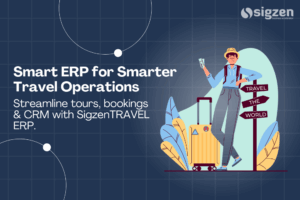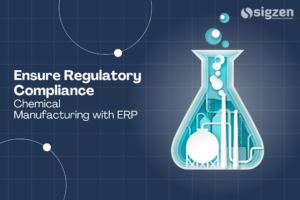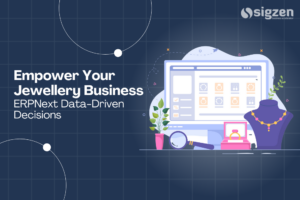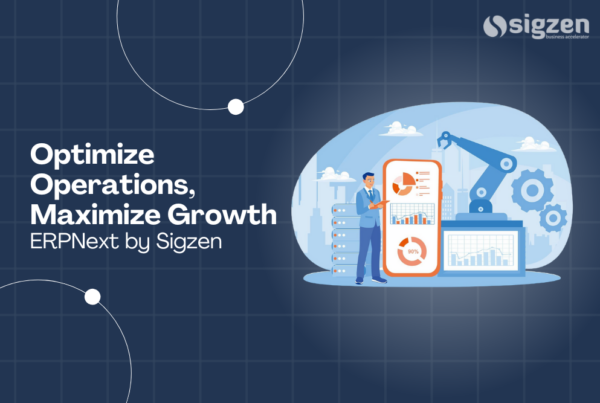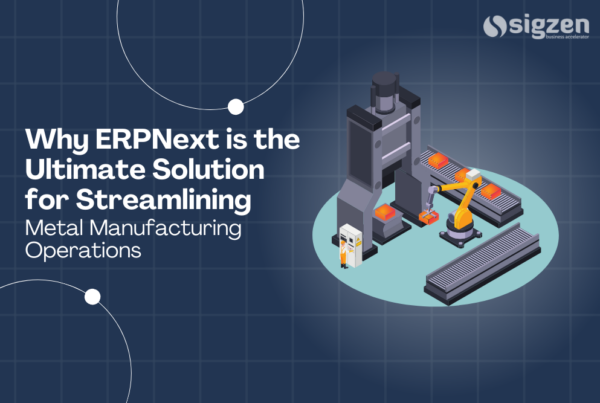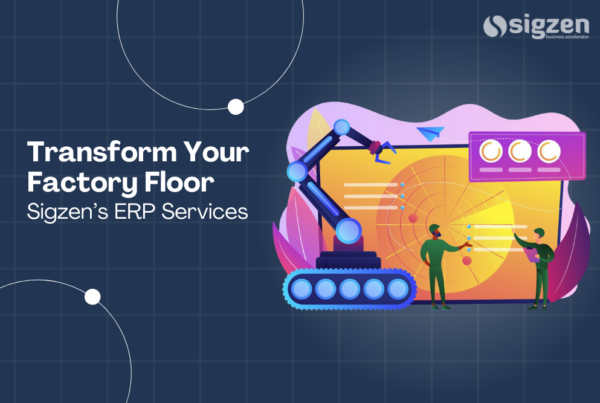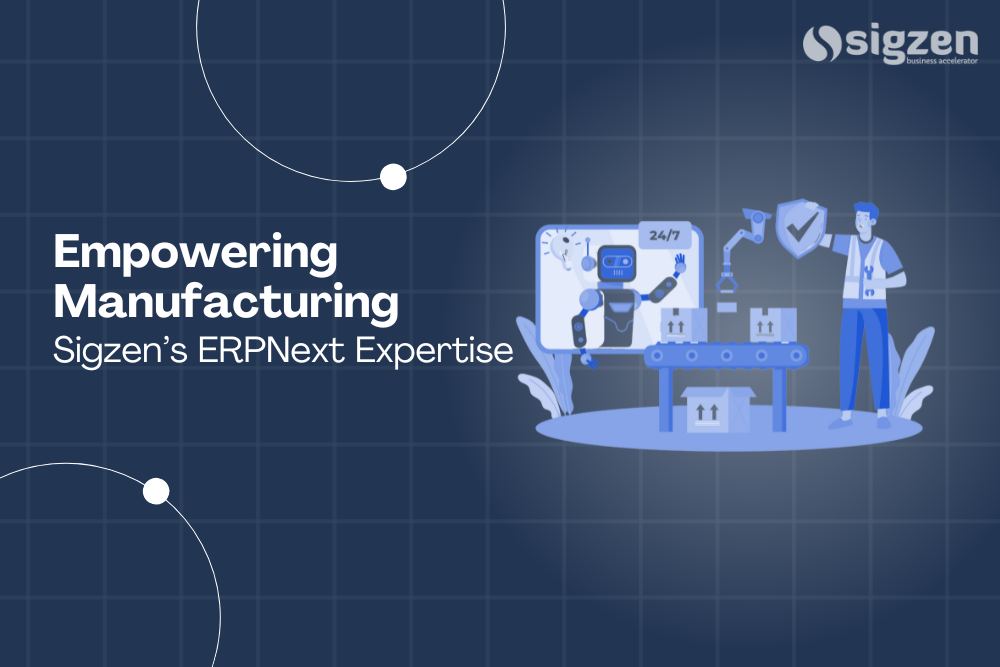
In the dynamic and ever-evolving landscape of modern manufacturing, the quest for operational excellence has become more critical than ever. In this pursuit, businesses are increasingly turning to advanced Enterprise Resource Planning (ERP) solutions, and one that stands out prominently is ERPNext. Spearheading innovation in the manufacturing module of ERPNext is Sigzen Technologies, a trailblazer committed to revolutionizing how businesses approach production efficiency. As we embark on this exploration, we delve into the intricate features of ERPNext’s manufacturing module and unravel the distinctive contributions that set Sigzen Technologies apart as a leader in this transformative journey.
1. Bill of Materials (BOM)
The Bill of Materials (BOM) within ERPNext is a foundational tool that enables the structured creation and management of product assembly instructions. It delineates the necessary raw materials, components, quantities, and processes essential for manufacturing a specific product. BOMs serve as comprehensive blueprints, outlining the hierarchical structure of items required for production, ensuring accuracy and consistency in the manufacturing process.
- Hierarchical structuring of components and subassemblies
- Quantities and units of measure for each item
- Version control for BOM revisions
- Cost estimation for materials and production
- Linking BOMs to specific products or assemblies
2. Work Orders:
Work Orders in ERPNext facilitate the practical execution of the manufacturing process. They allow for the creation, tracking, and management of production tasks associated with specific items listed in the BOM. Work Orders translate theoretical production plans into actionable steps, guiding the shop floor through the sequential processes needed to manufacture goods efficiently and effectively.
- Creation and assignment of work orders to specific resources
- Tracking progress and completion status of work orders
- Material requisition and allocation to work orders
- Labor hour tracking and assignment
- Integration with BOMs to define work order requirements
3. Manufacturing Resource Planning (MRP)
MRP in ERPNext utilizes diverse data inputs, such as BOMs, inventory levels, and demand forecasts, to automate and optimize the production schedule. By analyzing these variables, MRP ensures timely availability of required materials, minimizes wastage, and streamlines production processes, enhancing overall operational efficiency.
- Forecasting demand based on sales orders and inventory levels
- Automatic generation of purchase orders or work orders based on demand
- Material requirement planning for timely procurement
- Capacity planning and resource allocation optimization
- Realtime updates based on changes in demand or inventory levels
4. Production Planning
Production Planning within ERPNext involves strategic management of resources, scheduling, and allocation of tasks. It optimizes the utilization of available resources, labor, and machinery, ensuring that production targets align with demand forecasts and business objectives.
- Scheduling and sequencing of production activities
- Resource allocation and utilization planning
- Lead time estimation for production processes
- Aligning production plans with sales forecasts
- Flexibility to adjust schedules based on changing priorities
5. Shop Floor Management
ERPNext’s Shop Floor Management module oversees and coordinates activities within the manufacturing environment. It monitors workstations, tracks labor hours, manages machine utilization, and provides real-time insights into the production status, fostering an environment of operational transparency and efficiency.
- Monitoring workstations and machine utilization
- Tracking progress of work in real-time
- Allocating tasks to specific workstations or teams
- Recording production data (output, defects, downtime)
- Managing inventory movements on the shop floor
6. Quality Control
Quality Control functionalities in ERPNext empower users to define and implement quality checkpoints and inspection criteria throughout the manufacturing process. It ensures adherence to predefined quality standards, thereby enhancing product quality and customer satisfaction.
- Defining quality checkpoints at various production stages
- Inspection criteria and quality standards implementation
- Nonconformance management and corrective actions
- Documentation of quality test results and compliance records
- Integration with production processes for immediate action on quality issues
7. Inventory Management
Integrated with manufacturing processes, ERPNext’s Inventory Management module maintains accurate stock levels, oversees material usage, and facilitates timely replenishment of inventory. This integration ensures that materials required for production are available when needed, avoiding production delays.
- Real-time inventory tracking and visibility
- Stock level monitoring and alerts for reordering
- Material movement tracking (receipts, transfers, consumption)
- Batch or serial number tracking for traceability
- Warehouse management and bin location tracking
8. Costing and Financials
ERPNext’s Costing and Financials module provides comprehensive cost estimation, tracking, and analysis tools. It allows businesses to evaluate the cost of production, assess profitability, and make informed decisions regarding pricing and resource allocation.
- Standard and actual costing methods
- Cost analysis for materials, labor, and overheads
- Comparison of planned vs. actual costs
- Profitability analysis for manufactured products
- Integration with accounting for accurate financial reporting
9. Reporting and Analytics
The Reporting and Analytics features within ERPNext offer a suite of tools to generate diverse reports and analytics. These tools aid in analyzing manufacturing performance, resource utilization, production efficiency, and other key metrics, enabling data-driven decision-making.
- Customizable reports for production performance
- Dashboard views for real-time analytics
- Trend analysis and historical data comparisons
- Key performance indicators (KPIs) for manufacturing
- Drilldown capabilities for detailed insights
10. Integration and Customization
ERPNext’s flexible architecture supports seamless integration with various modules, allowing for a comprehensive view of the business. Additionally, it offers customization options to tailor the system to specific manufacturing processes and business requirements.
- Integration with sales, procurement, accounting, etc.
- Customizable workflows to match unique processes
- API support for third-party integrations
- Tailoring user interfaces to specific user roles
- Extensions or plugins for additional functionalities
11. Workflow and Collaboration
ERPNext streamlines workflows and fosters collaboration by assigning tasks, providing real-time updates, and facilitating communication among teams involved in the manufacturing process.
- Task assignment and notification features
- Collaborative tools for teams working on projects
- Workflow automation for repetitive tasks
- Document sharing and version control
- Realtime updates and communication channels
12. Compliance and Traceability
Compliance features ensure adherence to industry regulations and standards, while traceability functionalities maintain detailed records of production activities, materials used, and quality checks, ensuring transparency and accountability throughout the manufacturing lifecycle.
- Regulatory compliance adherence
- Audit trails for tracking changes and actions
- Documentation of production processes for traceability
- Serialized tracking of components or finished products
- Integration with quality control measures for compliance verification
In the fast-paced manufacturing landscape, the demand for advanced ERP solutions is nonnegotiable. Sigzen Technologies emerges as a beacon in this realm, offering a comprehensive suite of modules within ERPNext that caters to diverse manufacturing needs. Their expertise in the Bill of Materials (BOM), coupled with a commitment to precise structuring and seamless integration, positions them as leaders in optimizing manufacturing efficiency.
Sigzen Technologies doesn’t stop at BOM; their Work Order management system ensures real-time tracking, efficient resource allocation, and harmonious integration with BOMs, creating a synergy that empowers businesses to streamline production processes swiftly.
The Manufacturing Resource Planning (MRP) features by Sigzen Technologies are not just tools; they are strategic enablers. Leveraging data-driven insights, MRP tools excel in demand forecasting, optimal resource allocation, and timely procurement, ensuring seamless operational continuity.
In the realm of manufacturing efficiency, Sigzen Technologies shines by offering a comprehensive suite of solutions encompassing Shop Floor Management, Quality Control measures, Inventory Management, and robust Costing and Financial functionalities within ERPNext. Their commitment to customizable reporting, analytics tools, seamless integration, and tailored solutions cements Sigzen Technologies’ position as a trusted provider, meeting the ever-evolving demands and complexities within the manufacturing sector.
